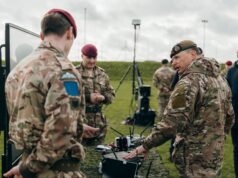A groundbreaking UK-developed atomic clock, harnessing experimental quantum technology, is set to revolutionise military operations, offering a significant leap forward in intelligence, surveillance, and reconnaissance capabilities.
Developed at the top-secret Defence Science and Technology Laboratory (Dstl), this quantum clock will reduce the reliance on GPS technology, which can be disrupted or blocked by adversaries, and provide a more secure and precise navigation and timing system for military forces.
Jonathan, a technical leader for MOD industry partner Infleqtion, said in a press release:
“Quantum is really important to the UK especially from a defence perspective. If you look at what’s happening in the world at the moment, it’s becoming increasingly obvious that we need better and more robust position navigation and timing services, and that’s something that quantum is uniquely placed to be able to provide.”
The clock’s unparalleled precision, losing less than one second over billions of years, allows scientists to measure time at an unprecedented scale, ensuring mission success even in contested environments.
“Integrating cutting edge technology into existing capabilities exemplifies the Government’s commitment to innovation in the defence sector, and to ensuring our Armed Forces have the best kit possible to keep us secure at home and strong abroad,” said Maria Eagle MP, Minister for Defence Procurement and Industry.
The potential applications of the quantum clock extend far beyond timekeeping.
“The trialling of this emerging, groundbreaking technology could not only strengthen our operational capability, but also drive progress in industry, bolster our science sector and support high-skilled jobs,” she added. Notably, quantum clocks will improve GPS accuracy, secure communications, and enhance the precision of advanced weapons systems, such as guided missiles, making them vital for future military operations.
The trial of this atomic clock represents a significant milestone in the UK’s quantum technology capabilities. It is the first time Dstl has tested a UK-built optical atomic clock outside of a laboratory.
“This first trial of advanced atomic clock represents a significant achievement in the UK’s quantum technology capabilities,” said Dstl’s Chief Executive, Paul Hollinshead. As quantum technologies continue to evolve, the new clock will provide the UK with an edge in navigation, timing-critical operations, and cyber warfare.
This trial is part of a broader research effort that has already seen the UK invest over £28 million into these cutting-edge technologies, ensuring the country remains at the forefront of defence innovation.














So the old firm can still come up with new tricks. I wonder how many other countries on planet earth can do this.
This is what frustrates me with the UK. We produce fantastic technology, we just dont invest in enough capabilities. I.E, more ships, vehicles etc.
£28m investment = peanuts for something this significant.
The big version goes into nuclear subs and ships.
The small version, when it is miniaturised, will go onto individual warheads.
It’s always been our niche though. The UK has always developed more technology than its limited size allows it to exploit. The major issue is ensuring a return on that investment. I believe nowadays we are much better at that, universities are well aware of the benefit of their IP and we still have world leading companies in certain fields like aerospace, defence and pharmaceuticals that can take advantage, many international companies also base research in the UK. The UK brain drain for the 50’s and 60’s has also halted. Now it’s more likely a US company like Google just purchases a UK operation like Deep Mind and keeps it all in the UK as opposed to the past when scientists would be poached to live in America.
There is significantly more money to be made and better jobs to be had in R&D than in manufacturing. The UK is small enough in the global context that we can like Switzerland focus on a smaller sub set of industry and skills.
I’d rather Deep Mind have stayed wholely in the UK if thats all the same….We are the only western economy that subjects itself to the whims of the Free Market at the level we do where everything is for sale to the highest bidder no matter what their intentions and no matter how hostile the takeover.
. See Imagination Technology for a sorry but all too familiar tale on what can happen to a world leading technology when the Chinese get involved.(Now owned by the Chinese Government), the list goes on and on to our shame. Over thr last 40+ years we have continually sold our best and most innovative companies out to foreign ‘investors’ from the Yanks to the Chinese…via our Free Market ideology to the detriment to the UKs economy & security. It’s about time this ‘Free Market’ ideology was constrained.
Do you think China will soon have one the same, wonder how they keep inventing things just as the West does? must just be luck i guess. We invent great things, cutting edge then just have no money to do much with them, its a shame.
Problem is a lot of UK tech is co developed with universities which are fairly pourus organisations and regularly targeted by cyber attacks.
I will also add that in the uk and the west there is a drive to make everything diverse for diverse sake and people who come from abroad don’t tend to have a loyalty to the uk this makes them very easy to target for other countrys to buy information
Companies hire from abroad cause theres huge shortages of skilled workers in the UK. The tech industry for example is crying out for workers. I’m doing a uni course atm to get a foot in the door!
So why is Russia advancing? Deckchairs perhaps.
The Chinese will be desperate to get their hands on this. Reverse engineering is all they do. The UK needs to guard it’s intellectual property and ensure China doesn’t immediately adopt technology it has taken British science years and lots of £ to develop.
Some years ago I would agree but we mustn’t underestimate Chinese technological innovation. For a start is Chinese advances in landing first stage rockets purely down to ribbing Musk’s memory banks? Of other much a genius after all is he. However more concerning is Chinese robot advancement, certainly they are doing things comparable and in some cases superior to known western equivalents, certainly in walking speed. However the most impressive, if it is indeed as shown (one always has to have reservations there be it the Chinese or Optimus) a robot walking naturally like a human rather than as if they are crouching to take a shitzu. One should not right off Chinese innovation as we once did Japanese innovation back in the 60s and 70s as mere copiers.
For GPS the advantage of obvious, although I don’t know if you have to launch a new constellation with quantum clocks on board.
But for everything else, er, What’s this for?
Anybody know?
Because the article interviewed is super vague
I have just checked out two articles one uk and the other US the latter giving quite a good insight into how it works, in another post here I too queried whether it worked in the way you suggest ie a far more accurate and long lasting version of attaining position through occasional updates and accurately predicting position in between or true superposition. This development covers a wider scope than navigation but that seems to represent a core use of it so relevant to the Blackett tests and the US reports from 2021 article I read. But it’s clear from the latter the two articles refer to the same general development of the way it works and its superposition so technically you won’t need updates though no doubt a second technology to concur with the predicted position is desirable. All is done within the clock/sensor itself including the two ‘separated’ particles (or in reality a single particle in its two positions) that provide the calculation of your position. You need to cool to near absolute zero and in that state the atoms takes on quantum characteristics to simplify a wave like behaviour and you then use lasers to create that separation. One remains where it is but the other is able to react to acceleration and movement and thus as you move you pass the atoms through sensors that measure the distance between them and thus predict the position of the platform itself from its starting point, all very sci-fi.
Now the major problems in this process are the power required to keep the vacuum and conditions at near zero and the absolute requirement to ensure no rogue molecules are left in the device as these will affect the accuracy and readings. The US article was related to that latter problem while enabling it to be achieved without great power requirements and thus size of the installation. I hope that gives some insight into how these clocks/sensors work though clearly it gets a lot more complex and beyond our true understanding as lay observers. But it’s clear that this technology has application in all manner of technology and well beyond defence. Underwater and underground technology will be the obvious beneficiaries as gps is problematical for such platforms but creating a stable and reliable foundation with manageable size and power for these quantum calculations to take will potentially impact on tunnelling, driverless cars, drilling, rocketry and of course computers.
Just as an add on the Imperial College work that was related to the Blackett tests from a few years back go back to Imperial’s initial lab based quantum clock in 2018 which itself was built on years of prior quantum research.
Thaks for the explanation.
You’re hardly a a lay observer sir if I may be soo bold.
Cheers dude.
The UK has the largest tech sector and Private Equity market in Europe. Reaction Engines was never short of investors, the technology just didn’t work. The UK has a long history of biging up things like TSR2 then lamenting their cancelation as a symbol of how we are no longer “great”. Largely because we also have a massive media industry that loves to hate the UK as well.
The reality is in most cases the project didn’t evolve or was cancelled for valid reasons, often because it was not as good as the hype made out. When you make up 1 % of the worlds population but carry out 8% of the science your not going to be able to follow up on everything.
Personally I would rather keep the science and let others do the manufacturing.
8% of worlds science by what measure?
Well you have made that statement about Reaction engines before and at best a gross simplification that you have failed to deliver evidence to support. Scott Manley did a report on it soon after the collapse and he determined that the as far as can be calculated from the outside the technology was sound. He made a statement in conclusion about it coincidentally that was similar to that I expressed when we previously debated this claim of yours (and indeed had questioned previously) and that was that sound or otherwise in recent years the complete package of the Sabre engine a great idea/technology or not was simply not going to find a large enough commercial or military marketplace that could support its overall development and make it worthwhile committing the funds required to do so. There is no publicly released evidence that it actually didn’t work, that’s your assumption. It really would have needed a US commitment to utilise it to have real hope of profitability but they are supporting other hybrid designs including rotating detonation and combo ramjet/turbojets so a difficult market to crack sadly. The biggest problem I would say is that the Earths gravity is such that it only just makes getting to orbit prectical even with multi stage rockets. An engine like Sabre as clever as it is with present technology and with the limitations of the craft it can power that need to be able to resist the vigors of getting to orbit and back and so so multiple times is marginal. It’s the problem with spaceplanes and certainly those not on the end of rockets like DreamChaser.
So that leaves high altitude hypersonic platforms and anything launched from height is better served by (S)ramjets so hypersonic aircraft or ground launched long range missiles but it’s an expensive solution for the latter and with no such uk platform in prospect. So hypersonic high altitude aircraft isn’t really much of a market for it sadly and at best a long way off so yes a technology without a proven market. However we will see if constituent parts of the technology live on, the pre-cooler the most crucial part was being tested by RR (successfully it seems) at Mach 3 (though clearly long term reliability is not yet proven) and Mercedes was developing it for F1 and automotive platforms generally, we will see what comes of this.
As for the investment picture technology investment in this Country is not impressive, not only Bond has said this but the entrepreneurs behind DeepMind too which is why Suleyman co creator has said he would not now invest in new UK startups. Equally recently there was criticism of Pension Funds after it was revealed UK pension funds were amongst the worst in Western Countries for high tech investment and the Govt committed itself (yeah I know) to getting them to change their conservative outlook.
Yes, cos the Chinese have never invented anything ever 🙄🤣
A step in the right direction and moving away from the US GPS will give us more flexibility
yes it seems we can still design and build good idea’s
We are also building our own GPS equivalent I believe, although the FOC is probably 10 years away as usual.
This will make UK GPS a lot less relevant.
However, it is better to have a system when you own the off switch!
I tend to agree with that last sentence, we need national control as much as is possible.
However I haven’t done so as yet but does anyone have a good understanding of how this technology works in relation to guidance. Clearly accurate clocks as with Harrison are vital to navigation but one presumes they work as did Harrison’s clocks with other technology or input to give accurate positioning. Is this the case with a quantum clock for example in establishing exact position by exploiting very occasional but very accurate star or gps readings and thereafter keep incredibly accurate prediction of position over large distances in between such input, or does it work with far more complexity via entanglement whereby two sub atomic particles, one at a known location the other onboard whatever platform, ship, plane, missile, drone and as they stay connected you can determine that platform’s exact location. That last seems very science fiction but as particles entanglement is being exploited in quantum computers and elsewhere I presume feasible.
They are working on a quantum inertial navigation system. It will know where it is because it knows how far it traveled in every dimensions. It won’t need external signals to calibrate like GPS does.
Again I can’t reply to Jim for some reason. I have done further research on how this works and have come to understand the process as far as a layman can anyway, how it works and have given a general run down in a post above if anyone is interested. Jim is correct it is completely independent of outside input and in US tests a similar set up has remained stable and accurate in lab conditions for well over a year. Not sure what the exact advancements in the article here refer to but I assume it’s similar to the articles I have read referring to miniaturising the technology via improved cooling techniques, keeping that condition stable and the ability to exclude rogue particles from the vacuum to cut out erroneous readings or/and perhaps improved sensor technology that the atoms pass through to determine the distance between the unmoving and moving super positioned linked particles.
I remember seeing the basic process of using lasers to create and measure the required dual linked states of a single quantum particle by Professor Jim Al-Khalili some years back and that has certainly helped give at least a basic understanding of what’s going on.
Quantum entanglement isn’t even proven yet maybe they’ve disproved relativity. Time dilation!?
…do not “give” it to the Americans. Learn the lessons of the past.
Slap a patent on it, so it can’t be copied, then charge them for every unit if they want to buy them from us.
Exactly right. It has to be patented, although that won’t stop the Chinese as they just get their hands on one or steal the blue prints and then good luck trying to take them to court.
Quite interesting the buddy fit that Blair encountered why he proposed a UK FMS tax.
The reality is the US DOD had done rather well out of UKIP.
Interestingly this is what kick started the UK to start rebuilding and protecting its own IP.
It threw a bit of a bucket of cold water over things.
We did pretty well out of the DoD as well, that’s why we gave them all the tech in the first place. Shortened WW2 and staved off the soviets from Western Europe without us having the bankrupt ourselves in the Cold War.
Well obviously it will have a whole number of patents to protect it, though you can ask Apple about how complex a business that is when Steve Jobs announced on stage with the first iPhone that they had it locked its technology down in patents to prevent copying.
One has to realise that Britain does not have absolute exclusivity on this sort of technology the US has probably the most extensive technological expertise in quantum technology certainly in chips and computing though China only a few weeks back claimed to be close to developing quantum technology that could break any code or technological defensive, though take that as with a pinch of salt. So we may have a breakthrough here and may even have a lead in this particular quantum technology but expect others to be on our tails. Indeed even Australia has been doing some very advanced research into quantum navigation so it may well be this will become a part of AUKUS at some stage with the 3 Countries pooling their knowledge.
High end defence tech doesn’t get patented. Patents are public documents. Do you think the jovial Mr Kim is going to let you check if the guidance system of his nuclear missile contravenes any UK patent? If this is going to end up in commercial products, then you likely take out a patent since anyone could buy it & pull it apart. Even so, some won’t if it is a process that the end product won’t give away. Patents have expiry dates. Secrets don’t.
Well as for some reason I can’t reply to DJ (I find that often here) I will do so here instead. You may if you read the first part of my reply see that I stated quite clearly patents won’t do much to protect this technology and indeed used an example to show it. Certainly where defence is concerned that makes it far more complex and problematical. But rarely are inventions and breakthroughs entirely defence specific and certainly this technology won’t be limited to defence even if it has its initial introduction there. Equally patents and I have seen a fair few in the technology field, tend to cover specific unique elements, as I say elsewhere other Countries and Companies have technology in this field especially in the US so what aspects are actually patentable are up to question certainly but fact is patents rarely give away the specifics of any given breakthrough just the general concept in as little revealing detail as possible, so primarily a tool to prevent others from claiming their own patents to the technology later that you have created, associated drawings are almost childlike no secrets are revealed therein, expiry dates are almost irrelevant in fast moving high tech. By the way Apple has numerous patents on A class chips which it bought for a considerable sum from the company that actually designed them, those original chips were extensively used in US nuclear missiles so to claim that defence tech isn’t patented isn’t a black and white question the answer is far more nuanced and it has nothing to do with Kim or your enemies nicking your technology it’s about preventing your ‘friends’ doing so, it’s about vital IP being protected wherever possible and judgements are made accordingly. When I worked at the British Library I even amusingly saw a patent for a flying saucer propulsion system registered by the Post Office of all organisations, which gave no real insight whatsoever into how it actually operated, certainly no help to a potential rival other than perhaps giving them the idea of one, which is the main reason patents are published at the last possible moment deemed desirable. Most tech has hundreds or many hundreds even of protected IP on tiny aspects and processes of the whole that give little away. Quantum sensors and navigation systems are hardly an idea no one else hasn’t thought of or isn’t working on and our own tests of such technology has been known even to the public for 18mths.
Given our small size we should be pretty proud we are playing in the same leauge as continent spanning nations.
Spyinthesky – I am trying your reply trick here to see if it works for me as well. I am not keen on the changes made here of late.
For some reason the 2nd paragraph of your original post I replied to did not come up. It’s only come up now that I am having a 2nd look. I am using an iPad – not sure if that is the reason. Would not have posted the way I did if I had seen the rest of it as you are obviously already aware of what I was getting at.
UK patents can be taken by the MOD if it’s of strategic importance. & you won’t get a penny. You mite get a bullet!?
Why is this article appearing now?
The test was widely reported back in May.
https://www.bbc.co.uk/news/articles/cz744gpl1dpo.amp
It will no doubt be donated to Ukraine with Starmers love.
It is years away from actual deployment
It isn’t
If this is the first time it has been out of the lab and DSTL are running things….
But we know this sort of technology has been out of the lab for some time being tested on the Patrick Blackett from 18mths ago so I am assuming this is related to those tests perhaps but either way asI say such re hnology hasn’t just crept out of the lab. By the way I have just coincidentally fell upon a US article in Defence One from 2021 claiming a big break through in quantum navigation. To quote ‘ Quantum science—one of the Pentagon’s top research priorities—may be about to deliver on its longtime promise of an alternative to GPS. A team of scientists from Sandia National Laboratory has developed a quantum sensor that doesn’t need the power or massive support machinery of previous prototypes’.
So it seems as I suggested above we are not the only ones perfecting this technology.
Not just Patrick Blackett. As I recall, the quantum timers were trialled on one of the Archer class a few months ago (HMS Pursuer), using Aquark’s prototype atomic clock system, AQlock. There was a UKDJ article about it at the start of November.
It’s supposed to be “Scheduled for deployment within five years.”
I cannot reply to replies for some reason but the article says “It is the first time Dstl has tested a UK-built optical atomic clock outside of a laboratory”.
Bob – Spyinthesky has already found a way around the reply problem (see further up). Working for me so far.
Intriguing, will this be brought to the table as the UK contribution to the corresponding AUKUS Pillar II initiative? Presumably, by extension, this also has relevance to the quantum computing arena? If so, will eventually bring major changes to cryptography. Obviously, it will be also a factor in increasing naviganal accuracy across future air and naval systems. BZ!
I think it will as both Australia and the US are also very advanced in this tech so no one has an absolute lead and all could benefit from sharing their research.
This is our contribution to pillar II. We expect hypersonic missiles and photon torpedos in return 😀
No issue with that, Ukraine are our allies, fighting Russia for us, and it’s a real-world test of missiles or drones equipped with such units.
You know the British government will just give it to America for £9.99 and then buy it back for £1,000,000,000
Not to piss on everyone’s parade about not letting china steal it or not letting the US have the IP..but china, Russia, the EU ( france, Italy and Germany) and the US have already developed their own stable optical lattice atomic clocks lab based optical lattice atomic clocks with all about the same accuracy and stability, and the U.S. have had a running optical lattice atomic clock for 15 years and is ahead of everyone else. So almost everyone knows how to build these clocks.
it’s now not about developing them but making them smaller and usable outside the lab ( transportable and stable) The US are ahead of the game have got theirs down to dishwasher size and been running it for a while, and the US National institute of standards and technology is planning to hike one up a mountain for some experiment or other about relativity. Russia in 2019 already had a very good program to get its optical lattice atomic clocks down to a meter squared and pretty much will have it sorted by now. China had a very clear and good project knocking up a small transportable optical lattice clock in 2020..which they happy published to show everyone what they are doing…china is very active in shoving its cutting edge science in the wests face as a form of both political warfare and I think deterrence. italy and Germany bizarrely knocked out a transportable clock very early on ( 2017).
Although this is good stuff, we cannot ignore the fact the UK is not ahead of the game in regards to major powers investment in latest generation transportable atomic clocks..infact Infleqtion only got funding for this project to start in 2023…years, France started at about the same time (2022) with a contract with Thales for a small optical clock ( not yet reported finished) well after the U.S, china and Russia started down this branch of quantum tec…for military applications and Germany and Italy for more scientific purposes.
So we are just now keeping up not leading the field.
Sadly true, far too often we see articles that suggest we are uniquely conquering these barriers when are just one of many developing and perfecting them. I see Eagles is once again talking big without any substance behind these words like actual plans to exploit it just nebulous bumf and pr.
Don’t know why everyone is getting excited, the airborne test of this was widely reported back in May, it’s not news.
All patents in the US are not public knowledge. Patents can be classified up Top Secret under the Secrecy clauses of the US Code. It is a very common practice for the US military services and contractors to apply for a classified patent. This practice goes back to the 1930s and it is believed that there may be as many as 10,000 secret patents issued by the US Patent Office.
So you think America already has this then and they are just keeping it secret and letting us dumb Brit’s think we did something useful.
Must be great being American
No wonder Canada, Greenland and Panama want to “join” 😀
American does already have this, you can look it up and read all about
It’s not so secret, the US have been publishing on their small transportable optical atomic clock for some time now.
So much knowledge and power to be the best at war games, the real cost is the slow destruction of our planet and the suffering as well as extinction of many life forms.
But then I guess the arms race is priority ££££ ? rather than the human race, God Help Us, seems the ruling 1% won’t !
Ah yes quantum – a word defined by the late Terry Pratchett to mean ‘add a couple of noughts on the end.’
Don’t give it away like we have all our other good inventions.
Many are destined to reason wrongly; others, to not reason at all; and others, to persecute those who do reason.
❤️☮️
This is why we can’t have beautiful things everything is militarized and used as weapons this is holding us back species it’s disgusting
A greater energy set at yeshua418q ticktock.com great defence energy 528hz light vibration energy proton neutrino energy weapon 💪 will share technology achieved investment is key 🔑 investment is wise move .greater defence energy in profile knocks put drones magnetic energy great field great energy source also contains energy hydrogen oxegen Mercury compound e5 energy se silver to contain energy .this great created by craig Turner hull uk Arthur Street hu3 6bj and great fact on this discovery of energy wireless magnetic energy craft in profile small project brilliant energy corona static energy star David energy sun energy da Vincent energy royalty codes TITARIAN EMPIRE bible codes ✨️ Turner uk 🇬🇧 Arthur Street hull hu3 6bj great thanks love your great work .hope this you find great interest enjoy
Da Vincent Leonardo energy royalty member craig turner y great ancestor jm Turner 17 75 great energy shown from this great code explained 17 = Q quarts energy 1+7=8 harmonic cymatic Mercury algama energy 418JOHN hz energy 369 9th jc energy explained with correct energy copy right protection Turner tgs energy. 9 I induction energy Hutchinson energy mothers dad and great fact .6 = f frequency energy j6 hewbrew alfa energy code da Vincent energy ✨️ j10 basic GEMATRIA energy codes jewel current frequency vibration energy jc ♥️ 10 =1+0=1= A alternating ac energy ♥️ ✨️ that 1 fits with 418JOHN energy code Q together blue red energy code .7th energy PLAZMA ✝️ MEANS ALSO energy 7th energy PLAZMA CROWN AMATHYST QUARTS GEM CODE REVELATIONS JOHN CODE REVELATIONS JOHN 12 =1+2=3= c current energy c sharp harmonic rf energy sound vibration energy proton neutrino energy magnetic energy 528hz energy pinned energy ethric ground shuman energy green 💚 code pyramid gliffs also confirms this fact .safety first radioactive energy and great truth thank you hope your all OK respect goes to all reading this section snd to the creator of this great truth